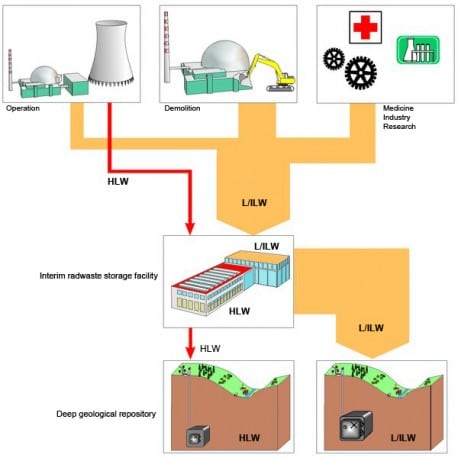Radioactive waste
Switzerland has radioactive waste. Two-thirds of this waste originates from nuclear power plants, while medicine, industry and research account for one-third of the total. The waste is broken down into three categories: high-level radioactive waste (HLW), long-lived intermediate-level radioactive waste (LL-ILW) and short-lived low- and intermediate-level radioactive waste (L/ILW).

Low-, intermediate- and high-level radioactive waste
HLW consists of spent fuel assemblies from nuclear power plants and vitrified (glassy) residues from the reprocessing of the fuel assemblies. This waste produces a large amount of heat due to radioactive decay.
LL-ILW comprises waste from reprocessing (e.g. cladding tubes and endpieces of fuel assemblies) and intermediate-level operational radioactive waste from nuclear power plants and research facilities.
L/ILW consists mainly of operational waste from nuclear power plants and research institutions together with waste from medical and industrial applications. Additional L/ILW is also produced when nuclear power plants and research institutions are decommissioned.
Waste management concept
Long periods of time will pass before the radioactivity of the waste has abated. As the beneficiary generation, we are already under an obligation to seek out and implement sustainable solutions for the management of this waste. The Swiss Nuclear Energy Act, NEA (Kernenergiegesetz, KEG) stipulates that all radioactive waste must be moved into deep geological repositories. According to the current time schedule, storage will not start before 2035. But even now, there is already a need for radioactive waste to be treated, placed in interim storage and transported.
According to the legislation, safe handling of the waste until the long-term management stage is the responsibility of the parties that produce the waste. As an independent supervisory authority, ENSI verifies whether the parties obliged to carry out waste management comply with the statutory regulations, and whether they take account of the latest international developments in science and technology. ENSI awards and coordinates research mandates in connection with regulatory safety research for the purpose of determining and expanding the current level of scientific and technical knowledge, so that this knowledge can be made available for supervisory tasks.
More information
- HSK-AN-5262: Proof of Waste Management: a Milestone on a Long Path, Principal Nuclear Safety Division (Hauptabteilung für die Sicherheit der Kernanlagen), File Note, Würenlingen, 2007 (PDF, german, 750 KB)